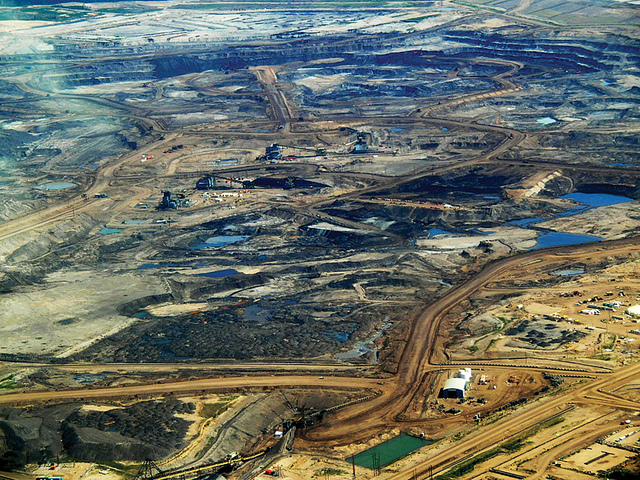Chip in to keep stories like these coming.
How much money has the federal government spent on lobbying on behalf of the oil industry? About $4.5 million.
A Greenpeace Canada freedom of information request has revealed that Natural Resources Canada holds a $4.5-million fund for international and domestic “outreach activities” for the tar sands.
This fund is contained in Natural Resources Canada’s International Stakeholder and Engagement Campaign to Build Prosperity for Canada, which is part of its $30-million advertising and outreach budget.
“We’ve known for a long time about the advertising spending,” said Keith Stewart, the Greenpeace Canada campaigner who filed the FOI.
That advertising spending runs to the tune of $22.7 million a year.
“But I hadn’t realized that there was this $4.5-million lobbying fund, which I view as a bit of a slush fund,” said Stewart.
Greenpeace Canada filed the Freedom of Information request in July 2014, just as the then-new deputy minister of resources Bob Hamilton was taking his post. They sought his briefing binder prepared by the department. Stewart says it’s Greenpeace’s routine practice as the briefing binder contains a summary of the department’s activities.
Greenpeace Canada received the contents of the binder early June 2015, and have just finished going through its contents. The memo to Hamilton about public relations spending on the tar sands is what caught Stewart’s eye.
It says that, in the 2013-14 fiscal year, the $4.5 million Outreach Fund was used for four initiatives.
The first was to “work with First Nations leaders to advance energy literacy among B.C. First Nation communities.”
Stewart says he finds it insulting that the government would call their B.C. initiatives “energy literacy” because he believes what they’re promoting is energy illiteracy. In fact, he believes these outreach efforts are trying to “grease the wheels” for the Enbridge and Kinder Morgan pipelines.
“This is basically a fund to try and lobby First Nations to support pipelines,” said Stewart. “The problem here is that First Nations have a pretty good idea of how they want to protect their lands and waters and building tar sands pipelines is not consistent with those plans.”
Outreach funds were also directed to “policy research” related to Europe’s Fuel Quality Directive during 2013/14.
This was the year that pressure from the Canadian government lead the European Commission to weaken environmental protection measures included in the directive.
The Fuel Quality Directive aimed to reduce green house gas emissions from transport fuel by six per cent by 2020 by indicating high carbon fuel with labels.
The European Commission was ready to slap a “dirty” label on oil from the Canadian tar sands, but backed down after intense lobbying by Canada.
Stewart said he believes this “policy research” is actually an effort to undermine European efforts to reduce greenhouse gas emissions.
“Basically what [the government is] trying to do is undermine legislation in US and Europe that would limit the market for tar sands,” said Stewart.
Catherine Bearder, member of European Parliament, told Die Zeit that the European commission had capitulated to pressure from Canada and thrown science out the window.
Tar sands oil creates about 20 per cent more emissions than oil extracted via conventional methods, a Stanford study concluded. Yet, the Canadian government maintains the Fuel Quality Directive is an effort to stigmatize Canadian crude.
“I don’t think Canadians want our government spending public dollars to lobby against environmental laws in other countries,” Stewart said. “We should be working with our allies to try and fight climate change, not trying to stop them from taking action to reduce green house gas emissions.”
The third area of spending the memo specified was partnering with the International Energy Agency to “advance knowledge of unconventional natural gas production.”
By that, Stewart said they mean fracking.
Fracking is an oil extraction method that is widely opposed in Canada and internationally because it contaminates groundwater and is emission-heavy.
“The federal government is basically siding with the oil companies to try and tell people there’s not a problem and they should not oppose this,” said Stewart.
The fourth area the Outreach Fund was allocated was to “work with Foreign Affairs to create conferences and workshops to advance Canada’s interests on Canadian energy issues.”
News of this FOI was first reported in the Guardian. Stewart said he thought the British paper picked up the story because of their readers’ interest in the Fuel Quality Directive.
“There’s an attitude amongst Canadian media that “yeah, Harper lobbies for tar sands. We all know that’,” said Stewart. “But I don’t think most Canadians realize how much of their money is being spent to do this.”
Natural Resources Canada did not respond to a request to comment before press time.
Megan Devlin is rabble’s news intern for summer 2015. She hails from Toronto, but she’s starting her Masters in Journalism in Vancouver. She got her start in journalism working at the Western Gazette where she was a news editor for volume 107 and online associate editor for volume 108.
Chip in to keep stories like these coming.



